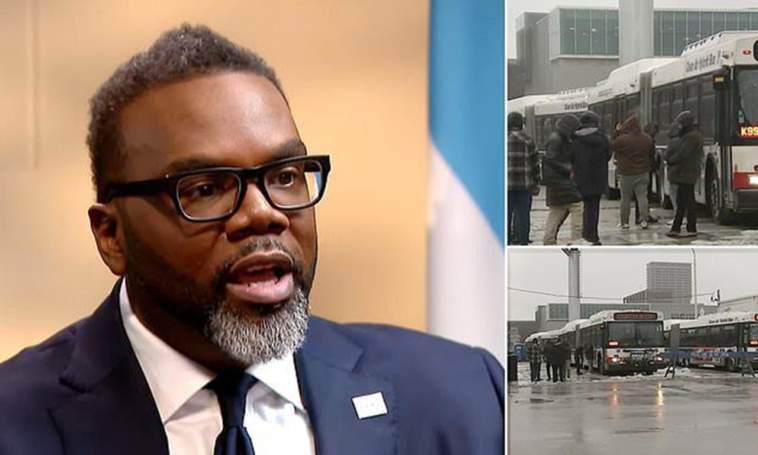Chicago’s mayor refuses to answer THREE times if he’ll raise city’s taxes to help pay for the migrant crisis. Brandon Johnson, the mayor of Chicago, faced persistent questioning about the possibility of raising taxes to address the ongoing migrant crisis during a recent interview.
The conversation, initially centered around the annual task of setting the city budget, took a turn towards Johnson’s commitment to continue his predecessors’ pledge of housing arriving asylum seekers.
As the host delved into the pressing issue of the migrant crisis, with over 20,000 individuals entering Chicago last year alone, she raised concerns about the strain on the city’s resources.
Currently, more than 500 migrants are waiting to be placed in one of the 27 temporary shelters the city has established, with approximately 200 individuals staying in warming buses at the designated landing zone.
With these facilities at full capacity and buses arriving daily from states like Texas, Franza (host) sought clarity on the city’s future financial response.
The critical question revolved around whether Mayor Johnson would consider adding a tax to address the escalating costs of the migrant crisis. Franza, noting the city’s expenditure of $138 million on the issue, pressed the mayor three times on this matter. Johnson, however, skillfully avoided providing a direct answer, opting instead to highlight his vision for city revenue.
“Well, I think people are familiar with what my vision is for revenue in this city, and my revenue, of course, is committed to making sure that we are doing everything we can to address the unhoused crisis in this city,” stated Johnson.
He emphasized a commitment to allocating resources to address the plight of the approximately 70,000 unhoused individuals in the city, particularly focusing on black families, and mentioned a substantial investment of a quarter of a billion dollars in his budget towards this goal.
Franza, apparently seeking a more straightforward response, repeated the tax question. Johnson’s response seemed to indicate a reluctance to commit to a specific course of action at this time. As three more charter buses were expected to arrive later in the day, he maintained a stance of keeping his options open.
The persistence of the tax inquiry appeared to irritate Johnson, evident in his visible frustration during the interview. When asked once again about the possibility of imposing a tax to address the migrant crisis, Johnson responded with some audible annoyance, stating, “Here’s what I’ve said repeatedly. This is an international crisis that requires—”
Interrupting Johnson, Franza seemed to reflect the sentiments of Chicago’s 2.7 million citizens. “We’ve heard you say that,” she interjected, expressing the need for a more concrete response to the financial challenges the city is facing due to the escalating migrant crisis.
The mayor’s evasion of a clear answer to the tax question raised concerns among citizens and observers alike. With the situation expected to worsen as temperatures drop and more migrants arrive, there is growing pressure on city officials to outline a comprehensive and sustainable financial plan to address the crisis.





One Comment
Leave a ReplyOne Ping
Pingback:Council to override Mayor Adams after he vetoes NYC police transparency bill